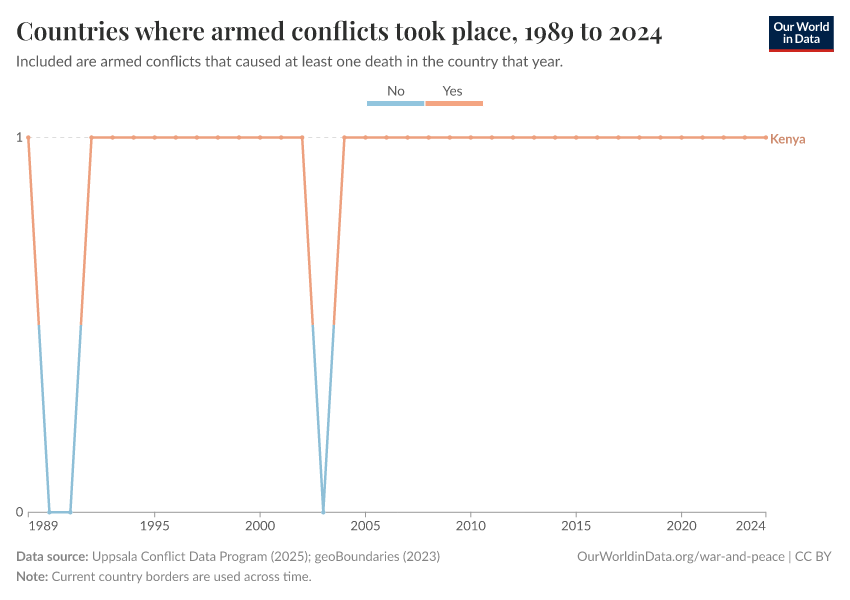Countries where armed conflicts took place

What you should know about this indicator
- '1' indicates that there was a conflict event in the given country. '0' indicates that there was no conflict event in the given country.
- An armed conflict is defined by the Uppsala Conflict Data Program (UCDP) as a disagreement between organized groups, or between one organized group and civilians, that causes at least 25 deaths during a year. This includes combatant and civilian deaths due to fighting.
What you should know about this indicator
- '1' indicates that there was a conflict event in the given country. '0' indicates that there was no conflict event in the given country.
- An armed conflict is defined by the Uppsala Conflict Data Program (UCDP) as a disagreement between organized groups, or between one organized group and civilians, that causes at least 25 deaths during a year. This includes combatant and civilian deaths due to fighting.
Sources and processing
This data is based on the following sources
How we process data at Our World in Data
All data and visualizations on Our World in Data rely on data sourced from one or several original data providers. Preparing this original data involves several processing steps. Depending on the data, this can include standardizing country names and world region definitions, converting units, calculating derived indicators such as per capita measures, as well as adding or adapting metadata such as the name or the description given to an indicator.
At the link below you can find a detailed description of the structure of our data pipeline, including links to all the code used to prepare data across Our World in Data.
Notes on our processing step for this indicator
UCDP provides geographical coordinates of each conflict event. We have mapped these coordinates to countries by means of the geoBoundaries dataset.
In some instances, the event's coordinates fall within the borders of a country. Other times, the event's coordinates fall outside the borders of a country. In the latter case, we have mapped the event to the country that is closest to the event's coordinates.
Conflict event with id "53238" and relid "PAK-2003-1-345-88" was assigned to "Siachen-Saltoro" by geoBoundaries. We have mapped it to "Pakistan" following the text in the where_description field from UCDP, which refers to "Giang sector in Siachen, Pakistani Kashmir".
Reuse this work
- All data produced by third-party providers and made available by Our World in Data are subject to the license terms from the original providers. Our work would not be possible without the data providers we rely on, so we ask you to always cite them appropriately (see below). This is crucial to allow data providers to continue doing their work, enhancing, maintaining and updating valuable data.
- All data, visualizations, and code produced by Our World in Data are completely open access under the Creative Commons BY license. You have the permission to use, distribute, and reproduce these in any medium, provided the source and authors are credited.
Citations
How to cite this page
To cite this page overall, including any descriptions, FAQs or explanations of the data authored by Our World in Data, please use the following citation:
“Data Page: Countries where armed conflicts took place”, part of the following publication: Bastian Herre, Lucas Rodés-Guirao, and Max Roser (2024) - “War and Peace”. Data adapted from Uppsala Conflict Data Program, geoBoundaries. Retrieved from https://archive.ourworldindata.org/20250909-093708/grapher/locations-of-ongoing-armed-conflicts.html [online resource] (archived on September 9, 2025).How to cite this data
In-line citationIf you have limited space (e.g. in data visualizations), you can use this abbreviated in-line citation:
Uppsala Conflict Data Program (2025); geoBoundaries (2023) – processed by Our World in DataFull citation
Uppsala Conflict Data Program (2025); geoBoundaries (2023) – processed by Our World in Data. “Countries where armed conflicts took place” [dataset]. Uppsala Conflict Data Program, “Georeferenced Event Dataset v25.1”; geoBoundaries, “geoBoundaries - Comprehensive Global Administrative Zones (CGAZ) 6.0.0” [original data]. Retrieved December 30, 2025 from https://archive.ourworldindata.org/20250909-093708/grapher/locations-of-ongoing-armed-conflicts.html (archived on September 9, 2025).